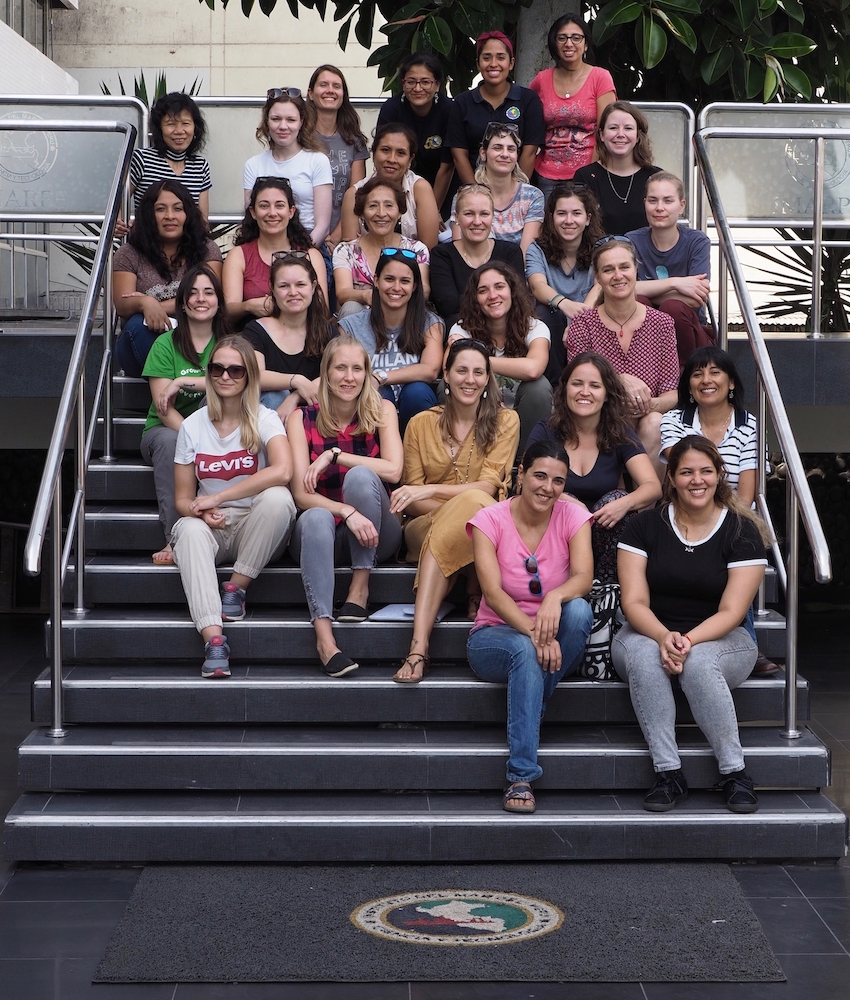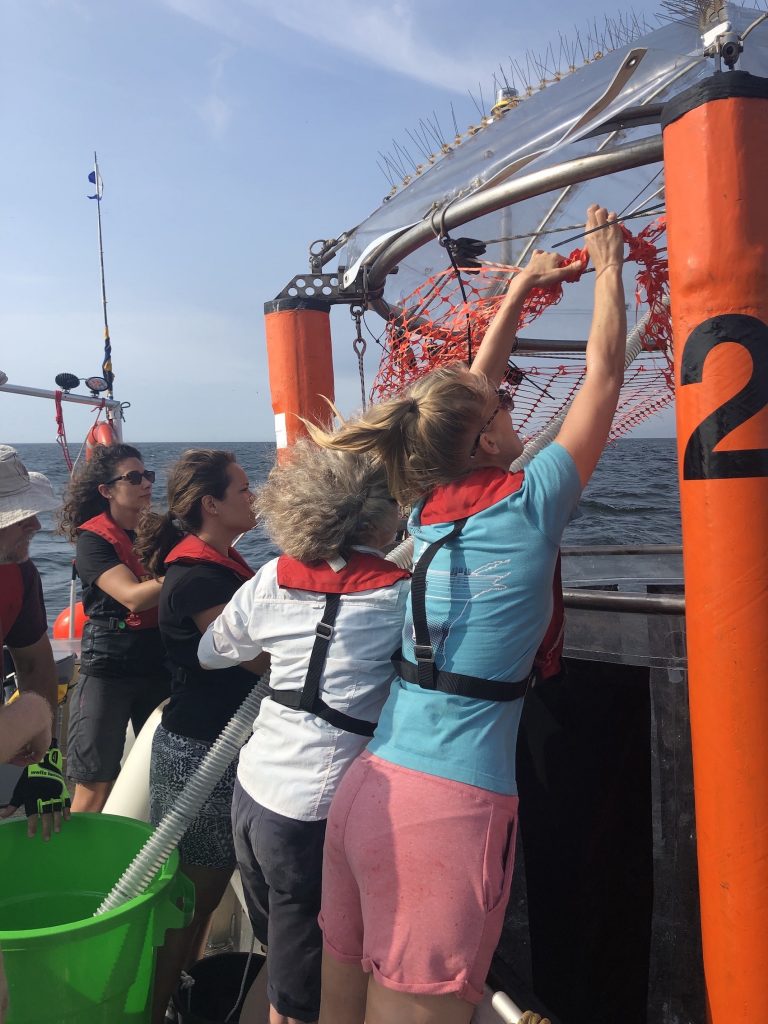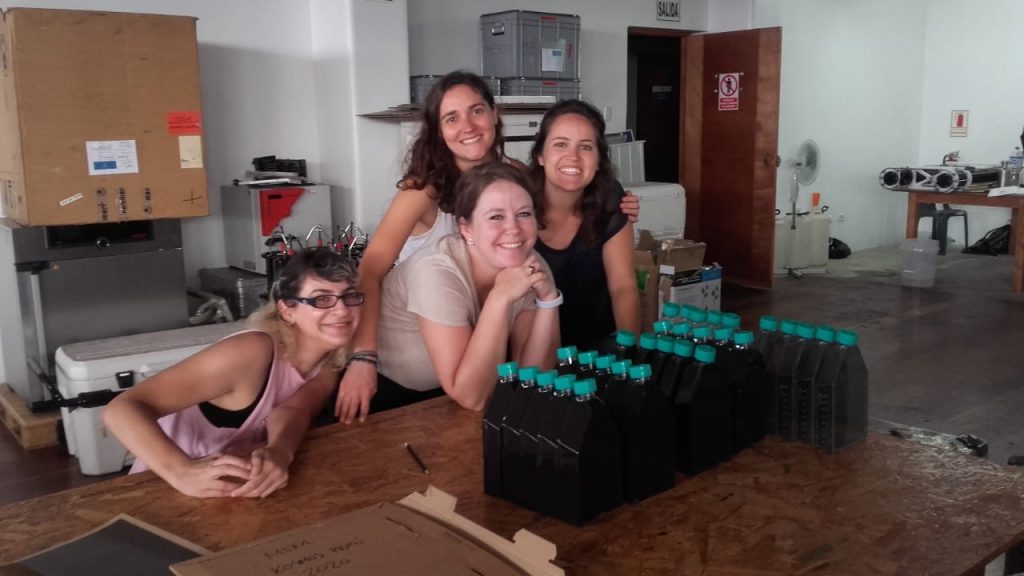The 11th February was the international day for women in Science, Technology, Engineering and Mathematics (STEM). Historically, gender differences have been present in science. Women have faced barriers for their work to be accepted by the scientific community and published in scientific journals, and for an extended period of time, they were even banned from any formal scientific education. The difference between men and women through the history of science is clearly shown by the statistics of the number of given Nobel Prizes. While from the late nineteenth century until now, women made great advances in establishing their position in research and education, presently, still only 29.3% of researchers worldwide are women.
Being a part of a big mesocosm experiment that requires strong international collaboration has helped us appreciate the role of women in science. To get an idea of what is the opinion in our small scientific community in our KOSMOS group, we interviewed four women and three men of our KOSMOS Team representing a wide range of life experiences and career stages:

-Anna Schukat is doing her second postdoc in the University of Bremen, where she also did her PhD on trophic interactions focusing on copepods in the Benguela Upwelling System.
-Steve Archer is a senior research scientist in the Bigelow Laboratory of Ocean Sciences, a small independent lab in Maine (US).
-Leila Kittu studied fisheries in Kenya, did her master in biological oceanography at GEOMAR and she is currently doing her PhD in marine biogeochemistry.
-Veit Dausmann is a postdoc in the Marine biogeochemistry group at GEOMAR, where he also did his PhD in Paleoceanography.
-Mar Fernández-Méndez is working at GEOMAR as a postdoc focused on phytoplankton and primary productivity. This was also the topic for her doctoral studies in the Alfred Wegener Institute in Bremerhaven and her first postdoc in Tromsø (Norway).
-Javier Arístegui is a professor and head of the Biological Oceanography group in the University of Las Palmas de Gran Canaria (ULPGC), in Spain. He is a marine ecologist focused on global change issues during the last years. He has been involved in the Intergovernmental Panel on Climate Change (IPCC) as contributing and lead author.
-Stella Berger is a freshwater ecologist also interested in marine ecosystems. She currently works at the Leibniz-Institute of Freshwater Ecology and Inland Fisheries (IGB) in Berlin, leading the experimental phytoplankton ecology group and coordinating the biggest lake lab in the world.

Do you feel that women are underrepresented in your field, department or studies? Give examples of your experience.
Anna: No. During my studies there were more women than men and also during my PhD. We are mostly females in my working group. There are a lot of women in science, but higher positions are generally occupied by men.
Steve: We run a semester for a local college that is typically dominated by girls. However, there is a discrepancy of how many women do their studies and how many of them get into senior positions.
Leila: I wouldn’t say underrepresented in general. There are a lot of women pursuing PhD in Marine science. But I think the further you get, for women, it has a lot to do with choosing to stay in science or start a family. At that point there is a difficulty with women staing in science, just because it’s a question of choosing.
Veit: In general, it’s not equal, the more to the top you go, the less women there are.
Mar: As soon as you go up the ladder, yes. In my master I was surrounded by super motivated and intelligent women that I thought will stay in science until being professors. And now, in my second postdoc I already realized that more than half of them had already given up science and the other half is considering giving up science due to different reasons.
Javier: There is an increasing number of women in marine science. For instance, in my faculty, there are as many women as men. It is, however, more difficult for women than for men to thrive in the scientific world once they get a job. Combining your work and family is difficult for women.
Stella: It depends a bit. Women are overrepresented at bachelors, master and even PhD levels. Leading a group is still quite balanced but when it comes to leading a department then it’s dominated by men. Out of six departments at my institute, two are led by women and four are led by men.
Have you experienced challenges or discrimination (or know women who had) in getting a job, proposals or something related to science just because of the fact of being a woman?
Anna: Not until now. But maybe I am not the right person to ask. I never had to apply for my positions, I was always at the right place at the right time.
Steve: When I was in Plymouth, UK, I had three postdocs, all girls. And they all wanted to start a family, so they had to take a lot of time off. Two of them had to take longer. It is tough if you take two years out.
Leila: Not directly.
Veit: In science less than in sectors outside science. I feel that in the generations before ours, women experienced more challenges. But I think that will change in our time.
Mar: Well, not until I finished my PhD. But as soon as I became a mum, and our work is very much related to fieldwork, I did sense in many interviews (before getting this job) that one of the main questions was “Are you willing to go on fieldwork with your small kid”? They asked me that several times, to make sure that I was really going to do that.
Javier: It depends on the country. For instance, in some countries from Europe or in the USA, women have the same opportunities as men do. However, when you look at some other countries, like from Africa or Central & South America, women often don’t have the same prospects. I believe this is something we need to improve at a global scale in order to reach a true equality balance between women and men, as part of the United Nations Sustainable Development Goals.
Stella: It is challenging for women to be in science. Historically, a lot of discoveries were made by women, but fame was taken by men. I think compared to old times it is much better and we have achieved a lot, but we need to work much harder. We also have the challenge if we want to have a family; we are usually the ones looking after the children and taking time off from work. We need to get back to science with double workload: taking care of the kids and also work hard to keep our positions. I am now a generation ahead of you and I have been suffering from this a lot because making a career and having kids was very challenging and at my time there was not much support from the society, but I have to say that I had a lot of support from my supervisor back at university.
On the other hand, do you have the feeling that sometimes it is an advantage being a woman?
Anna: I had a friend who applied for a higher position and she said in the end that she had the feeling she was only selected because she was a woman, and it was not based on her qualities and/or expertise.
Steve: Certainly, in some cases.
Leila: It shouldn’t be. I should be assessed by my skills, my ethics and abilities. I personally haven’t felt selected just because I’m a woman, but I know that some positions are given priority to women. It’s not wrong, it’s right to do it because we need representation but it’s just sad that we have to do it this way. It should be purely based on qualities.
Veit: There is the quota requirements that in case of equal fitness for the job, the woman should get it; but in the end I think it doesn’t make a big difference.
Mar: Not really. I think it’s true that with the quota, sometimes people approach you and want to have you submitting a proposal or being in a thesis committee just because they need to have the gender balance. But I still think that that doesn’t counterbalance all the negative sides. We are still the ones that when pregnant or breastfeeding can’t go on cruises, or conferences, we can’t just leave the kid at home. However, still when it comes to applying for grants for funding for example, women get the same discount time for having a kid than men, independently of the time of maternity or paternity leave you spent at home. So, what we should be aiming for is equity and not equality, because we are not equal. I don’t know how it should be done but our differences should be considered.
Javier: Sometimes, if the quotas have to be filled.
Stella: There is in principle this regulation that women are prioritized. If you are scientifically equally qualified for a position then women and handicapped are prioritized, which is “nice” because we are in the group of handicapped. In the science field it is not so much of an advantage.
Overall and from your own experience, do you think we are in a point of equal access and opportunities? Is it improving or has it been improving?
Anna: Yes. There was a lot of discussion about gender equality. Compared to earlier times, I think it’s easier nowadays.
Steve: It has improved, it is heading in the right direction. But still even at higher level, there is some sort of discrimination. It is difficult to create a supportive system for both males and females.
Leila: No. There is the perception that there are equal opportunities but in reality, there are not. The criteria are always different on how men and women are judged. For a couple, the responsibility of the mother to the child and how this will relate to her job is a point of discussion for an interview. I am not so sure the male partner is judged on that criteria on an interview. I think it’s changing but we are not there yet.
Veit: I get the feeling that due to these movements, it’s improving, and the women are more confident. I think if a woman really wants to get a job, she doesn’t have the same chances of getting it but has improved (when compared to 50 years ago; because then the women stayed at home and took care of the kids, the classic role mode); but we are not there.
Mar: If you would have asked me this four years ago, I would have said yes, I see it’s improving, I think this is all great and I see all these measures being taken by institutes, committees, governments, and you would think that this actually helps. But, to be honest, the reality is not really changing, or just very little. In the end it all relies on us (on women) to change things, and if it’s still the case and the numbers still show that in high positions are mostly men, we haven’t managed that much.
Javier: In the EU, in general, I would say yes, at least to get a first job. For instance, in the former framework programs of the EU, where I was involved as reviewer, there was a big interest to push and reach a gender balance of funded research grants and programs coordinated by women. I think that the EU has been making a big effort to reach equal opportunities for women and men (sometimes even greater for women) to get access to jobs, grants, and funding programs. However, I am not sure that this policy is translated in the same way to each country of the EU.
Stella: We are not there yet. There is much more to be done. I am working in AQUACOSM and we are trying to balance the gender and we are very good at this. But I think we are not there at senior level. And we need to think how to integrate family in scientific careers. Perhaps day care for children, supported by the state or universities might work.

In conclusion, although much progress has been made in offering equal opportunities, the gender gap remains. This gap is clearly visible when looking at the number of men occupying leading positions in science. The problem originates from several reasons. Perhaps the most obvious one is that women are struggling to succeed in a career in science and look after a family at the same time. Traditionally, it is still widely accepted that women should take time off work, while sacrificing part of their scientific career.
Currently, at the KOSMOS experiment in Peru, there is a 38:46 female to male ratio, meaning that men are only slightly dominant. Being at the master’s level, we, as young early career female scientists need role models in higher positions to look up to. We need to see that having a family doesn’t mean sacrificing your career. We hope that in our generation, women can establish themselves equally throughout the entire scientific community. Participating in this project and seeing strong, devoted women has motivated us not only to continue pursuing a career in science, but also to demand structural changes in system.
Mirian Arellano and Silvia Georgieva (Master students in the Marine Biogeochemistry group at GEOMAR)